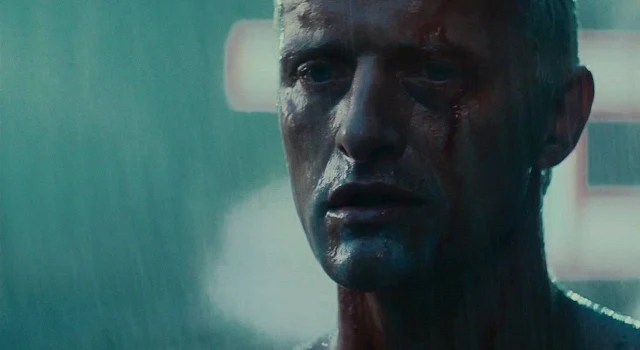The monologue reflects on Batty's experiences and mortality:
Hauer famously adapted the originally scripted speech, which he described as "opera talk" and "hi-tech speech," and added his own line.
After Hauer's death, Leah Schade of the Lexington Theological Seminary wrote of Batty as a Christ figure, with the nail through the palm of his hand, and his act of pity towards Deckard as a representation of Christ's sacrifice for humanity.
"C-beams" likely refers to "collimated beams", which are highly concentrated and directional beams of light. In the context of the movie, it is unclear exactly what the c-beams are, but they are likely some kind of advanced technology or weapon system that Batty encountered in his travels.
"I've seen things you people wouldn't believe. Attack ships on fire off the shoulder of Orion. I watched c-beams glitter in the dark near the Tannhäuser Gate. All those moments will be lost in time, like tears in rain. Time to die."Is he really the bad guy of this film?
Hauer famously adapted the originally scripted speech, which he described as "opera talk" and "hi-tech speech," and added his own line.
Critics praised the speech as one of the greatest in science fiction cinema, and Hauer's delivery as heartbreaking in its evocation of the memories and experiences that have driven Batty's short life.
Here's the originally scripted line:
I've known adventures, seen places you people will never see, I've been Offworld and back… frontiers! I've stood on the back deck of a blinker bound for the Plutition Camps with sweat in my eyes watching stars fight on the shoulder of Orion... I’ve felt wind in my hair, riding test boats off the black galaxies and seen an attack fleet burn like a match and disappear. I've seen it, felt it...!
Both are hunter and hunted, both are in pain, and both struggle with a hurt, claw-like hand. The speech is preceded with an act of pity from Batty towards Deckard (he lets him live), which raises him morally over the commercial institutions that would kill him. The white dove that flies up from Batty at the moment of his death is a symbol of hope and something human, suggesting that in the replicant, there remains a place for humanity.
Is that why Roy saved Dekkard?
After Hauer's death, Leah Schade of the Lexington Theological Seminary wrote of Batty as a Christ figure, with the nail through the palm of his hand, and his act of pity towards Deckard as a representation of Christ's sacrifice for humanity.
This monologue has become an iconic piece of film dialogue that is often quoted and analyzed for its emotional impact and its reflection on the human condition. GNR's Axl Rose probably borrowed the 'time to die' line for the lyrics at the start of Welcome to the Jungle.
The monologue speaks to the idea that even the most extraordinary moments of our lives are fleeting, and that they will eventually be lost to time. This message is particularly poignant in the context of the film's themes of mortality, artificial intelligence, and the nature of humanity.
The monologue also represents a turning point for Roy Batty's character. Throughout the film, he is portrayed as a ruthless and violent replicant, but in his final moments, he shows compassion and empathy for Deckard, despite the fact that Deckard has been tasked with hunting him down. This act of kindness suggests that Roy has come to understand the value of life and the importance of making a meaningful impact on the world before his own time runs out.
The monologue also represents a turning point for Roy Batty's character. Throughout the film, he is portrayed as a ruthless and violent replicant, but in his final moments, he shows compassion and empathy for Deckard, despite the fact that Deckard has been tasked with hunting him down. This act of kindness suggests that Roy has come to understand the value of life and the importance of making a meaningful impact on the world before his own time runs out.
What are the c-beams referenced in the Tears in the Rain monologue?
Fun Fact: The film Solider, features a soldier who served in the battles referenced in the monologue.
















